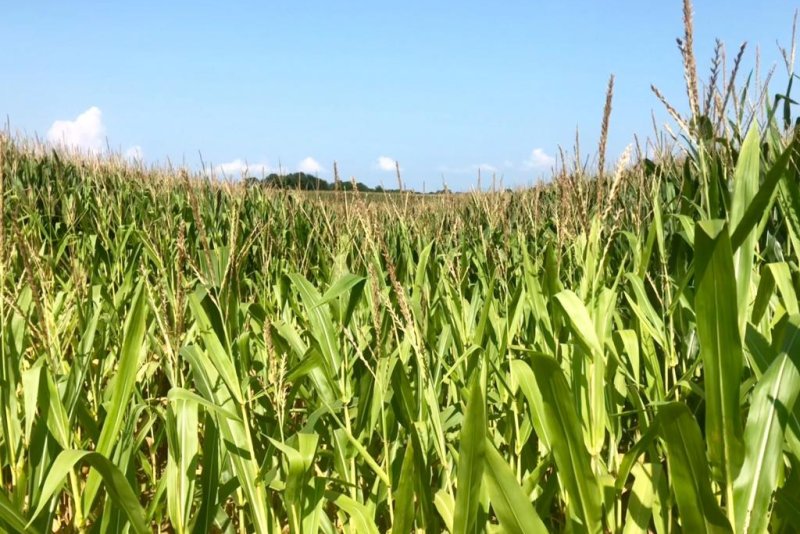Markets for corn evaporate during coronavirus pandemic
By Jessie Higgins

Corn prices are falling fast as the markets for the vegetable disappear during the coronavirus pandemic. Photo by Jessie Higgins/UPI
EVANSVILLE, Ind., April 29 (UPI) -- The market for corn has evaporated during the coronavirus pandemic, and farmers worry they'll be unable to sell this year's harvest.
More than two-thirds of the corn grown in the United States goes either to feed livestock or make ethanol, according to the U.S. Department of Agriculture. Both those industries are taking severe hits during the pandemic.
"The first thing that knocked the corn market down was the collapse of ethanol," said Blake Hurst, a corn grower who is the president of the Missouri Farm Bureau.
"People just aren't driving as much," he said. "Now, we're seeing concerns in the market because we're losing packing plants. Farmers are euthanizing their animals, so livestock herds are shrinking."
Ethanol production has been cut nearly in half since February, according to data released by the Renewable Fuels Association.
Meanwhile, ethanol stocks have hit a record high, climbing to 27.7 million barrels by April 17, up from 24.1 million barrels a month earlier, according to the U.S. Energy Information Administration.
It's unclear to what extent meat packing plant closures will impact demand for livestock feed -- especially after President Donald Trump said Tuesday he would sign an executive order to make meat processing plants stay open amid the pandemic.
The impact still could be large, though, Hurst said.
More than a dozen slaughterhouses have closed due to workers becoming sick since the start of the pandemic. Livestock producers who are unable to sell their animals already are killing them.
"I know there are farmers who have had to kill their pigs," Howard AV Roth, president of the National Pork Producers Council, who raises and weans pigs in Wisconsin, told UPI on Thursday. "Farmers are aborting sows. It's really awful."
More than a dozen slaughterhouses have closed due to workers becoming sick since the start of the pandemic. Livestock producers who are unable to sell their animals already are killing them.
"I know there are farmers who have had to kill their pigs," Howard AV Roth, president of the National Pork Producers Council, who raises and weans pigs in Wisconsin, told UPI on Thursday. "Farmers are aborting sows. It's really awful."
In addition, corn exports have ground nearly to a halt as port workers around the world stay home to avoid contracting the virus.
"It is a struggle to ship anything right now," said Floyd Gaibler, the director of trade policy and biotechnology for the U.S. Grains Council, a Washington, D.C.-based trade organization that represents the corn, sorghum and barley industries.
That problem exists "even to our top markets," Gaibler said. "They are open, but the ports are all backed up."
Around 20 percent of America's corn is exported, according to the USDA. Those markets are essentially on pause, Gaibler said.
The combined market disruptions are pushing corn prices down rapidly. Corn was trading at close to $3 per bushel Tuesday, down from close to $4 in January, according to the Chicago Mercantile Exchange.
But despite plummeting price and disappearing markets, farmers this year intend to plant a large corn crop, according to USDA surveys. This is in part because planting decisions are made -- and supplies purchased -- around the start of the year.
Farmers may make some last-minute changes to their planting plans, but probably not a lot, the farm bureau's Hurst said.
With markets shrinking fast, farmers might enter their fall harvest with high stocks of stored corn.
"We're just at the beginning of the planting season right now," said Andrew Novakovic, a professor of agricultural economics at Cornell University.
"Farmers have indicated they intend to plant a lot of corn this year. If that ends up being true, we could end up with a large crop this fall on top of a large carry-over."
"It is a struggle to ship anything right now," said Floyd Gaibler, the director of trade policy and biotechnology for the U.S. Grains Council, a Washington, D.C.-based trade organization that represents the corn, sorghum and barley industries.
That problem exists "even to our top markets," Gaibler said. "They are open, but the ports are all backed up."
Around 20 percent of America's corn is exported, according to the USDA. Those markets are essentially on pause, Gaibler said.
The combined market disruptions are pushing corn prices down rapidly. Corn was trading at close to $3 per bushel Tuesday, down from close to $4 in January, according to the Chicago Mercantile Exchange.
But despite plummeting price and disappearing markets, farmers this year intend to plant a large corn crop, according to USDA surveys. This is in part because planting decisions are made -- and supplies purchased -- around the start of the year.
Farmers may make some last-minute changes to their planting plans, but probably not a lot, the farm bureau's Hurst said.
With markets shrinking fast, farmers might enter their fall harvest with high stocks of stored corn.
"We're just at the beginning of the planting season right now," said Andrew Novakovic, a professor of agricultural economics at Cornell University.
"Farmers have indicated they intend to plant a lot of corn this year. If that ends up being true, we could end up with a large crop this fall on top of a large carry-over."
No comments:
Post a Comment